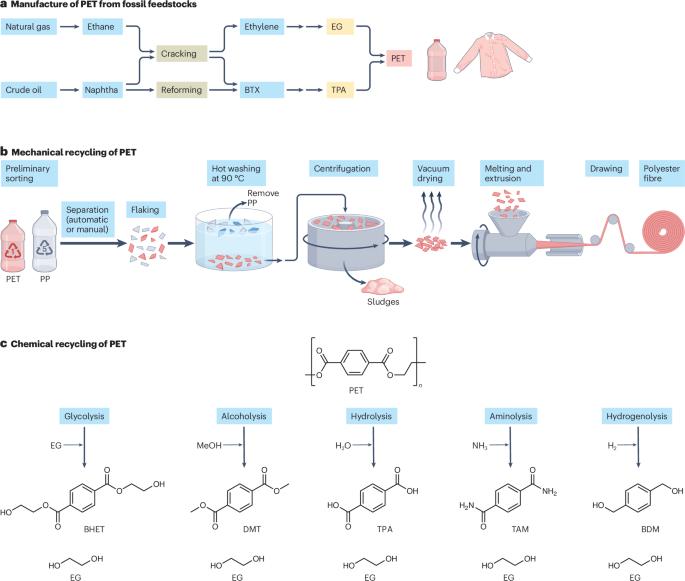Polyester-degrading enzymes in a circular economy of plastics
IF 37.6
引用次数: 0
Abstract
With only a fraction of plastic waste being recovered and the majority incinerated, landfilled or released into the environment, plastic is increasingly accumulating in aquatic and terrestrial ecosystems, leading to widespread pollution. Biocatalysis offers a route to the sustainable recycling of synthetic polyesters, such as polyethylene terephthalate (PET), which is commonly used in textiles, food and beverage packaging, representing a major source of plastic waste. In particular, polyester hydrolases can deconstruct recalcitrant synthetic polymers at scale. This Review discusses the role of biocatalysis in a circular economy of plastics, outlining enzymatic modification and deconstruction strategies for synthetic polyesters. Moreover, protein engineering and computational approaches are examined to design and optimize polyester hydrolases for large-scale recycling in key industrial applications. Finally, the importance of economic viability is highlighted, including strategies to make biocatalysis a cost-effective and sustainable plastics recycling strategy. Plastic pollution could be partly addressed through the biocatalytic recycling of plastic waste streams. This Review discusses the identification and optimization of polyester-degrading enzymes for the large-scale recycling of plastic waste.

塑料循环经济中的聚酯降解酶
由于只有一小部分塑料废物被回收,大部分被焚烧、填埋或排放到环境中,塑料越来越多地积聚在水生和陆地生态系统中,导致广泛的污染。生物催化为合成聚酯(如聚对苯二甲酸乙二醇酯(PET))的可持续回收提供了一条途径,PET通常用于纺织品、食品和饮料包装,是塑料废物的主要来源。特别是,聚酯水解酶可以大规模地解构难降解的合成聚合物。本文讨论了生物催化在塑料循环经济中的作用,概述了合成聚酯的酶修饰和解构策略。此外,蛋白质工程和计算方法的研究,以设计和优化聚酯水解酶大规模回收的关键工业应用。最后,强调了经济可行性的重要性,包括使生物催化成为具有成本效益和可持续塑料回收战略的战略。塑料污染可以通过生物催化回收塑料废物流来部分解决。综述了塑料垃圾大规模回收利用中聚酯降解酶的鉴定与优化。
本文章由计算机程序翻译,如有差异,请以英文原文为准。
求助全文
约1分钟内获得全文
求助全文

 求助内容:
求助内容: 应助结果提醒方式:
应助结果提醒方式:


